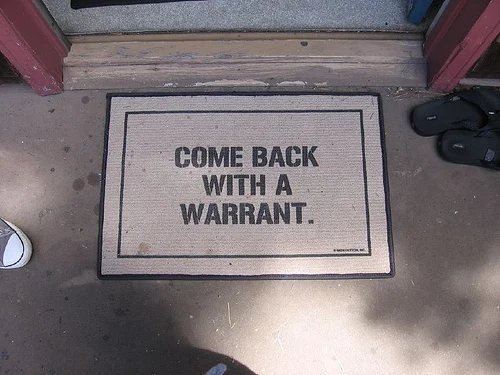For this first installment of a lengthy criminal series, I will address basic concepts as it relates to search and seizure of a residence. I have spent a great deal of time in the past referencing how to handle talking with police during any investigation ( say only “I want an attorney”), and often, part and parcel of any investigation is search and seizure. It is important that a lawyer get involved as soon as possible in your case, and it’s equally, if not more, important for a person to protect their rights until the lawyer is involved. Always demand to see a warrant before law enforcement enters your home, demand a lawyer, and do not consent to search. Despite these demands, officers will often search anyway; your instance on making these demands however may allow an attorney to keep unlawfully obtained evidence from being used against you. Here, I will set out the basics for searches of Homes.
The General Rule is that under the fourth and fourteenth amendments, persons have a right to be free from unreasonable searches and seizures without warrants. Of course, an officer may obtain a warrant from a judge if he convinces a judge there is probable cause to search the residence. However, often searches are conducted without a warrant under certain exceptions, and sometimes unlawfully.
If the rule is that an officer has to have a warrant for your residence, you may wonder how it is they often conduct home searches without a warrant. There are four basic exceptions to the need to obtain a warrant, the first and easiest being consent. Often times, persons give consent to search their residence- even when guilty. They often believe that they must let the officer in, as the officers do not tell them they don’t have to agree. This is wrong. You do not have to let law enforcement into your home just because they ask- even when they are demanding. Ask them to seek a warrant.
Officers may also enter a residence without a warrant if they see illegal items or acts in plain view. Officers have a right to come knock on the door, as any memeber of the public. If, while being in an allowed space, such as the front porch, law enforcement sees (or smells in some states including Kentucky) first hand the illegal act or items, they may enter the home without a warrant. If the officers enter form places not open to the public based on plain view, it may be impermissible and you should make sure to inform your attorney. For instance, if an officer is in the back yard of the home, or other place not open to the public, and then sees the illegal act, the exception may not apply, and the evidence obtained may be suppressed or not allowed to be used against you.
Emergencies, often referred to as “exigent circumstances,” also will allow law enforcement to enter a residence without a warrant. Examples of this include safety concerns and the destruction of evidence. For example, if someone called law enforcement and stated that they believed someone was trying to break in the home, law enforcement may be justified to enter the residence for exigent circumstances to ensure the safety of the occupant, and if in doing so, discovered illegal conduct or items, may then use those items against persons. Officers may also enter the home if, when at the door, or otherwise lawfully investigating a home, they hear or have reasonable belief that someone may be destroying evidence, such as flushing drugs in a bathroom. The officers must have reasonable belief that an emergency exists in order to justify exigent circumstance.
Outside of these circumstances, officers generally need a warrant to enter a residence. Officers may remain near the residence while waiting for the warrant, and may even detain or prevent persons from entering the residence in order to preserve the scene. If you find yourself at the door with a law enforcement officer, remain in your home, demand to see a warrant, demand an attorney, and contact one as soon as possible to discuss the circumstances which have lead to police involvement. If you follow these rules, your attorney may have the ability to preserve your rights if you are charged with a crime, to which all citizens are entitled.


